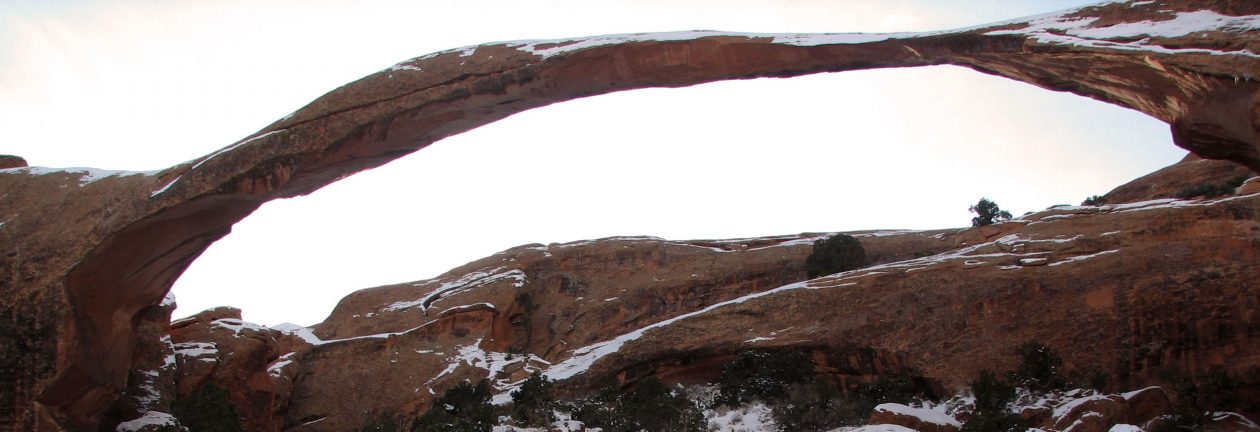Mini Gobi, Mongolia
The third day . . .
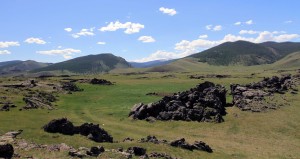
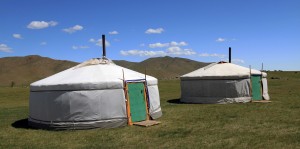
We slept in until 10:00 and with the sun out, we could finally appreciate the surroundings. We were in the Orkhon valley with the river (of the same namesake) not too far away, and short rocky outcrops scattered throughout the green hills in the valley. My first duty at hand was finally getting to use the Nomadic style outhouse with the one plank removed from the wooden floor; my next task was to pack and eat breakfast.
After having some breakfast snacks, the Frenchman and I set out for the nearby waterfall which is fed by the Ulaan Tsutgalan river and which joins the Orkhon River shortly after it’s 20 meter drop. We hiked along the Orkhon River canyon enjoying the views; though I kept my eyes on the ground just as much as the scenery since I was wearing sandals because my shoes hadn’t dried out from last night’s adventure (i.e. I didn’t want to step in manure).
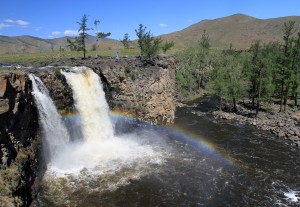
We reached the falls after about one kilometer and snapped plenty of photos while there. In the distance a man in a suit was being filmed, possibly by a national news station. We then returned to the ger, loaded our packs in the vehicle, and drove to the owner’s (of the place we stayed at) residence (another ger). There we were invited in and offered some süütei tea (hot milk tea with salt). His ger was nicely set up with solar panel and satellite dish on the outside, modern laptop, nice cabinets, two beds, couch, and stove on the inside. It was one of the nicer gers we visited on our journey. We were offered some shölte khool, but having just eaten breakfast I declined.

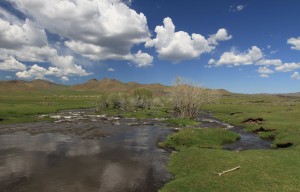
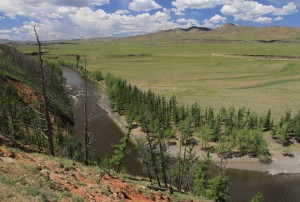
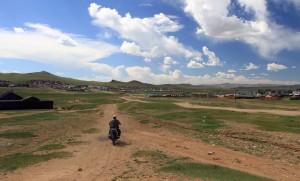
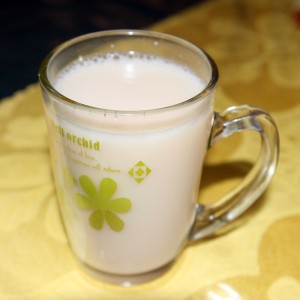
After exchanging pleasantries and thank yous, we set off to our next destination: the ‘Mini Gobi’. We trekked across more rugged trails through the open countryside until we reached a small town where we ate our lunch: rice, vegetables, a kind of hot dog, and more süütei tea. Then, since my traveling companions on this tour were dangerously close to running out of cigarettes, we stopped at four different markets in town before finally being able to purchase some at the last stop. Now that we were properly equipped, we continued to the ‘Mini Gobi’, a collection of sand dunes that was actually where we stopped on the first day to see the bactrian camels on the side of the road. Of course, one look at a map shows me that this well out of the accepted limits of the actual Gobi Desert and is used to draw tourists in to the local ger camps.
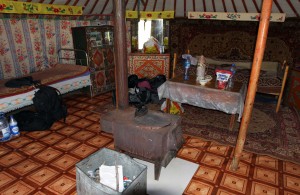
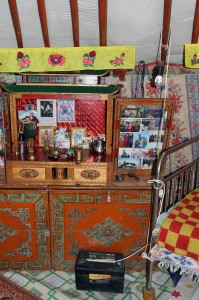
When we finally reached our destination, we encountered two Americans who would be staying the night with us and who were on a separate tour arranged by the same guesthouse we went through; though they were being driven around in a drab green Russian-made van. We were all staying with a nomadic family and we would be sleeping in their spare ger, which was very nice inside, as far as gers go, and even had a box with wood, newspaper, and manure (they use all readily available resources for fuel), to be used to start a fire in the stove if it proved to be a cold night. On the dining table inside the ger, there was a bowl of aaruul (dried milk curds) chopped into thin, rock-hard, rectangular blocks; I found these to be too sour, bitter, and ultimately revolting; I ate about half of a block and then quietly tossed the remainder into a prairie dog hole. The nomadic family also had three young playful children; the one boy was taking shots at us with his twig rifle.
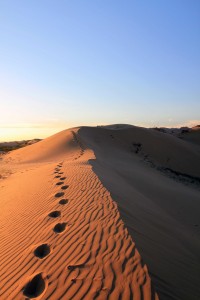
Once we settled our bags down, the Frenchman and I hopped up between the two humps of our bactrian camels and were led by one of the men on horseback. We rode in to the collection of sand dunes at varying speeds, then turned around and headed back. We then witnessed the woman of the ger milk their cows; afterwards we ate dinner, which was some more piping hot shölte khool (apparently this is the one food every nomad knows how to, and does frequently make). After finishing dinner, the nomadic family’s older son, who had just been dropped off on motorcycle, led me on a horseback ride through the scrubby bushes east of their camp. The horseback ride was much more pleasant than the camel ride – it was more comfortable and smoother.
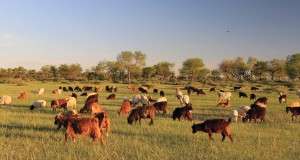
After enjoying the camel and horse rides, I set back out to the collection of sand dunes to wander around and snap sunset photos. On the way back I passed through one family’s collection of thrown-out glass bottles – unfortunately many people in this country litter; luckily, there aren’t that many people and it is a vast country, so even though we encountered a lot of litter on this tour, it didn’t manage to spoil the near-pristine scenery.

I then walked back to the ger, knocked the sand out of my shoes, and prepared for sleep. While I was typing yesterday’s journal entry on my laptop, the young boy who led me on my horseback adventure came in and took an interest, so I showed him and eventually two of his other siblings the photos I took of South Korea and Mongolia. Then it was bedtime for all of us.
